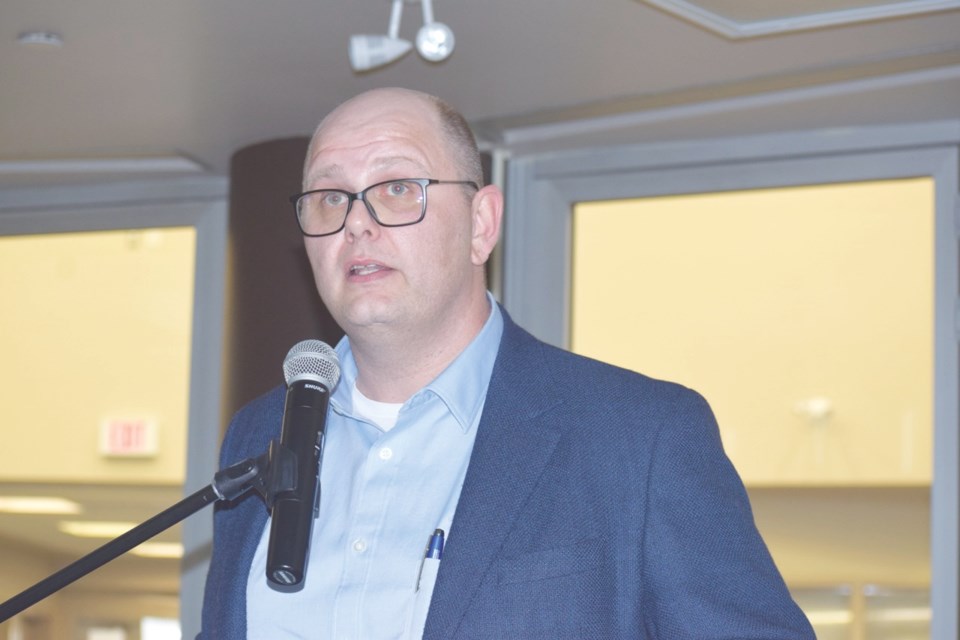The potential associated with carbon capture and storage (CCS) technology to combat climate change was highlighted during an information session at the Southeast College’s Estevan campus on Thursday afternoon.
The Saskatchewan Building Trades and the International Brotherhood of Boilermakers hosted the session. Estevan was selected as the site because the Boundary Dam Power Station is home to the first CCS facility of its kind in the world.
Dion Malakoff, the executive director for Saskatchewan Building Trades, said he was pleased with the message he heard in Estevan. It was the first time the organization has held such a gathering on CCS.
He believes CCS provides tremendous potential for the province to provide affordable electricity to consumers.
“We have coal. We have a lot of coal, and the last thing I want to do is see somebody have to decide whether to pay for food or power one day. If we have our coal, we can keep it cheap,” said Malakoff.
“The costs are coming down with carbon capture. We can continue on and have affordable, sustainable power for years to come, for my kids’ kids, while helping the environment.”
Saskatchewan Building Trades supports CCS because Saskatchewan is home to extensive coal reserves, and the technology would allow people to keep their well-paying jobs in the mining and power generation sectors.
“To now retrofit all of those units is a lot of construction jobs,” said Malakoff.
Malakoff also read a letter that his nine-year-old son Eli wrote about a month ago. It stressed the importance of caring for the environment.
“Treat the world the way you treat your home,” Eli wrote. “Think of the plants we eat. If we keep littering, we won’t have them. If we keep littering, we won’t have oxygen either. Think of the parks, if we keep littering we won’t have them anymore.”
Children have been recycling and thinking about the environment since they were in preschool.
“The next generation is going to look at us and ask what did you do? What did we do in this room today? What did we do to ensure the next generation has clean air, water, etc.?” Malakoff asked.
Several speakers addressed the crowd as well. Estevan Mayor Roy Ludwig, who has worked at Westmoreland Coal Company for the past 43 years, said clean coal technology is very important to him and to Estevan’s future.
“I’m sure that all of my brothers and sisters at SPC (SaskPower Corporation) and the mines will attest to, these are great jobs, great paying jobs and we’d like to keep them going in our community and continue to expand on the clean coal technology that we’re proud of.”
The city would like to see the Shand Power Station and Unit 6 at Boundary Dam retrofitted with clean coal technology.
“We feel it’s a very important, environmentally friendly part of keeping power going through all of our homes in this province,” the mayor said.
Each unit will become more affordable as time goes on, and Ludwig said CCS carries global benefits.
Cory Channon from the International Brotherhood of Boilermakers said the union is a strong advocate for CCS technology. They support the provincial government for the leadership they have shown to implement the technology.
He said it’s important to continue to host events such as the one in Estevan to bring these thoughts forward while the world looks at ways to fight climate change.
“There are far too many political divisions being created out of climate change and these types of technologies. We embrace all of these technologies that will of course make the world a better place, with better air, better water and better everything,” said Channon.
Once Channon was finished speaking, a 15-minute video was shown on CCS technology.
Beth Hardy and Corwyn Bruce from the International CCS Knowledge Centre, and Rob Mitchell from the Global CCS Institute addressed the crowd.
They discussed how it was expensive to retrofit Unit 3 at Boundary Dam, but moving forward, the cost is coming down.
“When they talk about natural gas versus coal, and what’s going on in today’s market, when you throw CCS on to say Shand, for an example, there is going to be a price tag there, and you have to justify that it’s going to be the same (cost) or even cheaper than the alternative out there, being natural gas,” said Malakoff.
Not only will it be cheaper to retrofit future units, but they will also be better.
There were growing pains and challenges at Unit 3 when it went online, but Malakoff noted it is now it is a legitimate carbon capture unit with minimal interruptions in the system.
Most of last year’s outage at Unit 3 and the CCS facility stemmed from when a thunderstorm struck Boundary Dam in June.
Malakoff said he was disappointed with the size of the crowd in Estevan, but it was in the afternoon on a Thursday. Due to the schedules of the experts they brought in to speak, they couldn’t have an event in the evening or weekends.
Further information sessions will be in Regina and Saskatoon.
“For the very first one, being in Estevan with Boundary Dam Unit No. 3, we thought it was a fitting setting with the miners and the mayor himself being a miner. We thought it was important to be there (in Estevan) first.”



